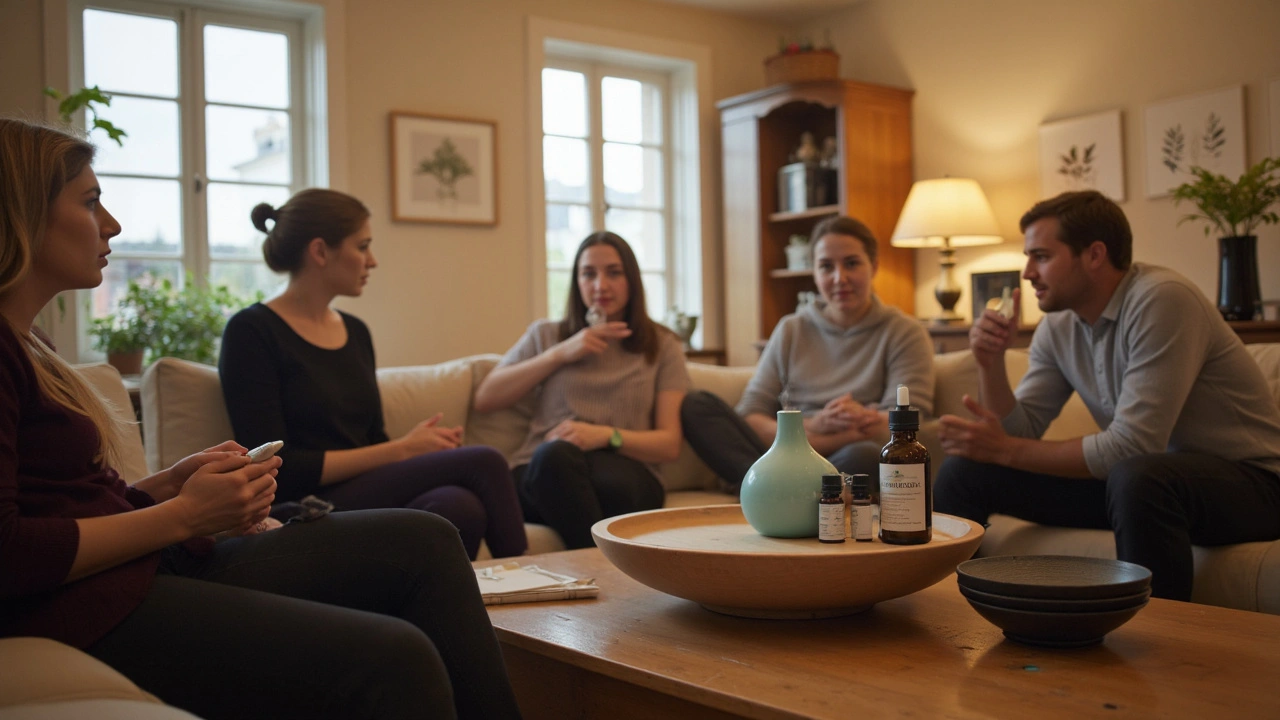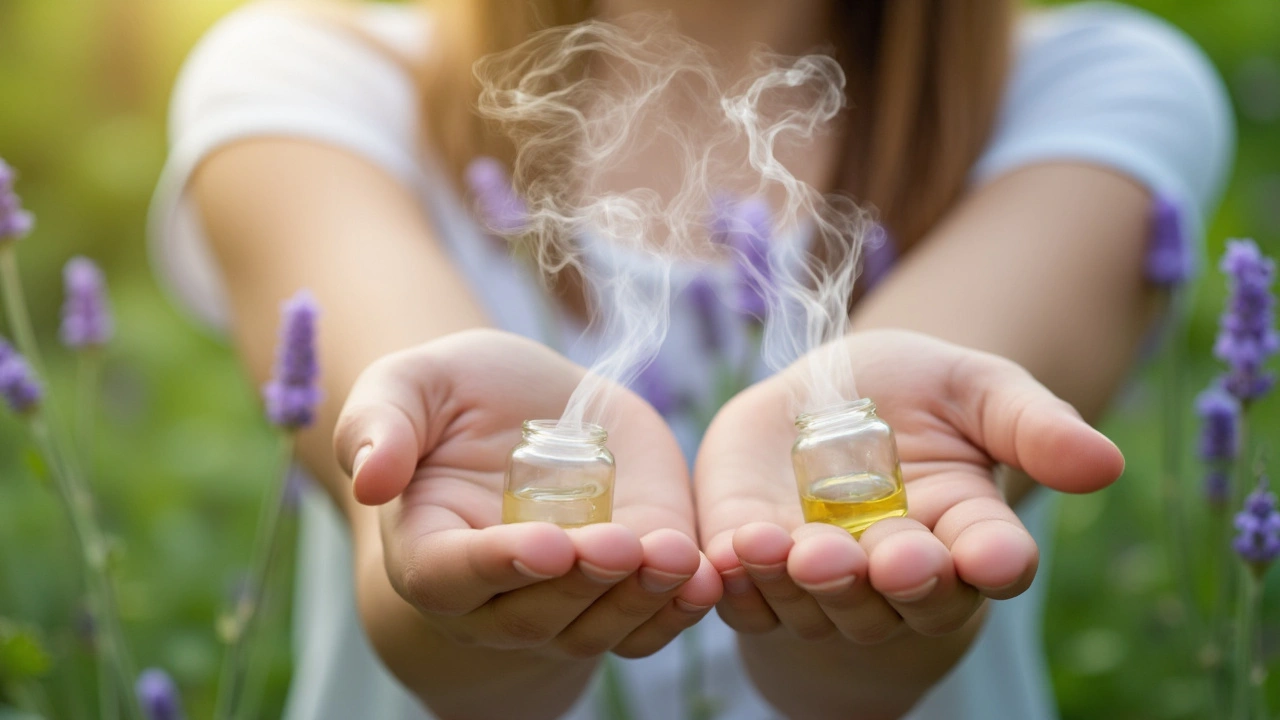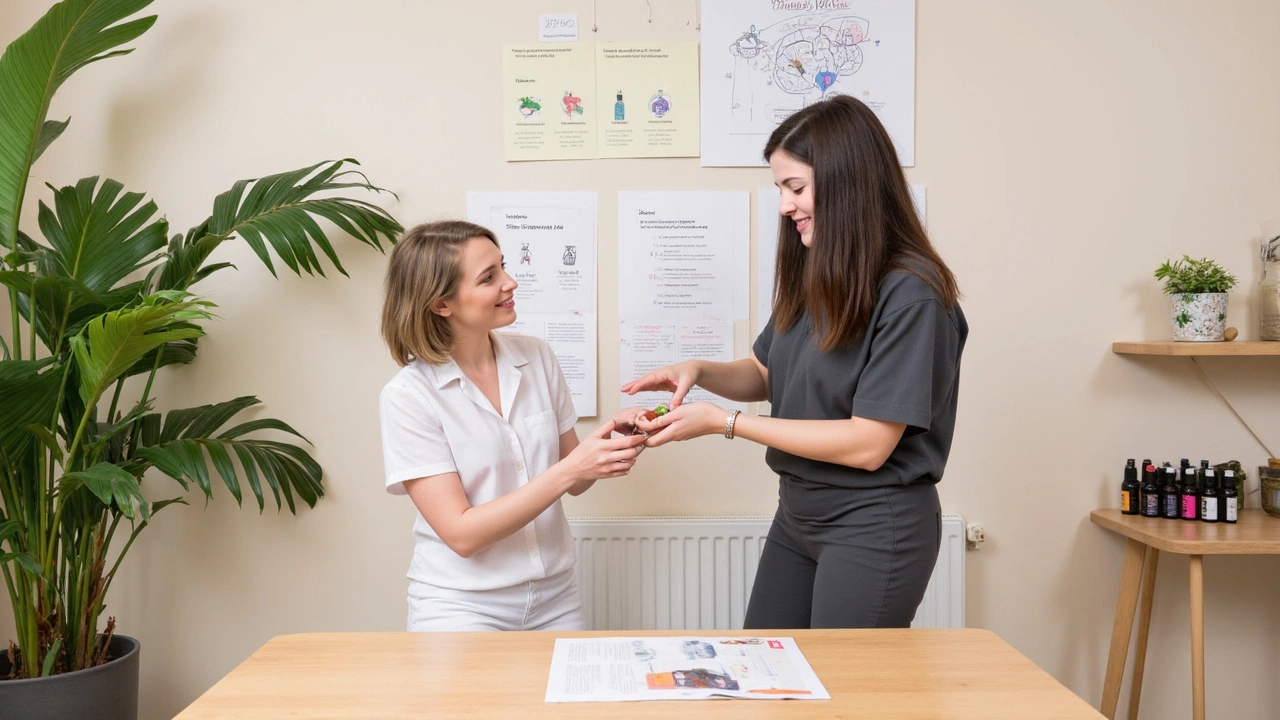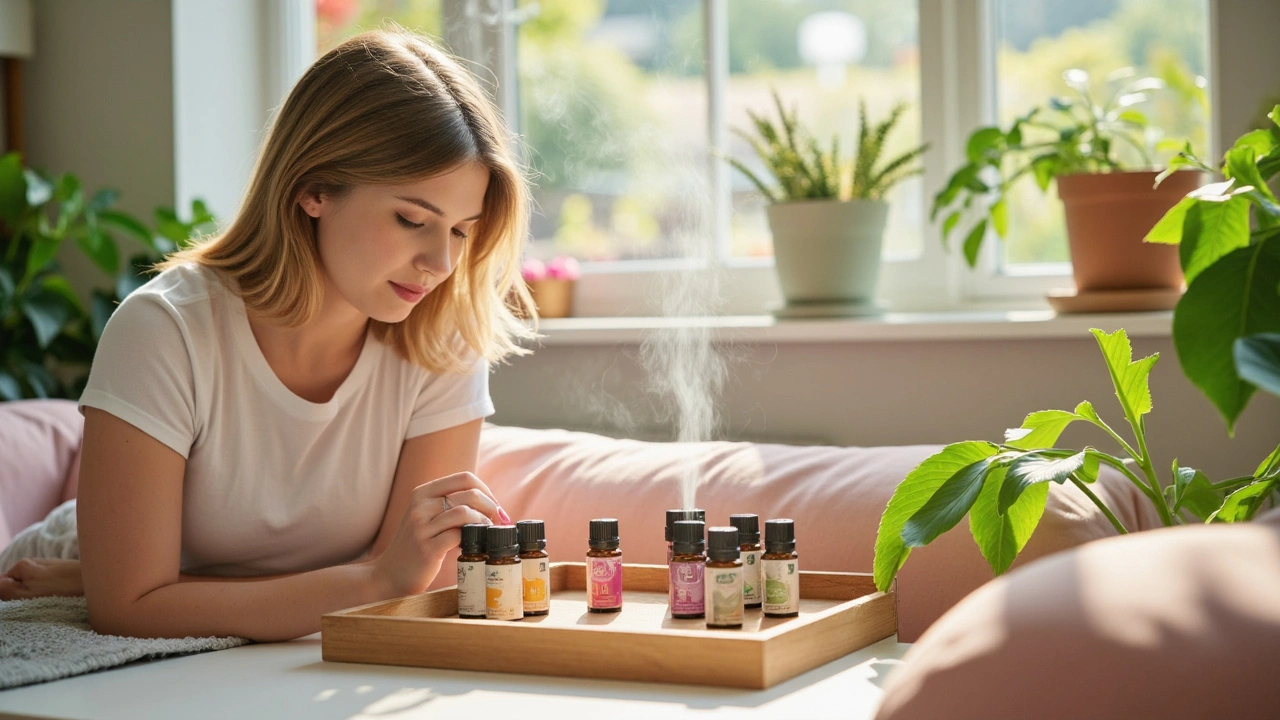Aromatherapy Massage: Real Ways It Improves Mental Health

You ever notice how a certain smell can take you straight back to a memory or a feeling? That’s not just nostalgia—it’s your brain hardwired to react to scent. Aromatherapy massage uses this shortcut to help with stress, anxiety, and even mood swings. You’re not just getting a rubdown; you’re soaking in the effects of essential oils chosen for your mind, not just your muscles.
This isn’t about candles or spa trends. Some scents, like lavender and bergamot, actually send signals to your brain’s emotional center. Forget the idea that only “relaxing” oils work, too—peppermint, for example, can clear brain fog and boost alertness. If you feel like your thoughts won’t slow down or your mood’s all over the place, the right combo of touch and scent can make a big difference.
Curious which oils really work and how to make your next session more effective? There are a handful that researchers and therapists agree on. I’ll share those, plus a couple of simple tips to level up your experience, whether you’re booking with a pro or trying it at home.
- How Aromatherapy Massage Affects the Brain
- Best Essential Oils for Mood and Anxiety
- What Happens During a Session?
- Science-Backed Benefits and Limitations
- Making Aromatherapy Massage Work for You
How Aromatherapy Massage Affects the Brain
Ever wonder why smelling something good can change your mood in seconds? Here’s what happens: when you breathe in essential oils during an aromatherapy massage, tiny scent molecules head straight to your nose and hit your olfactory system. That’s the direct line to the limbic system in your brain. This area controls your feelings, memories, and stress levels. So the right scent does more than just smell nice—it actually tells your brain to chill out, feel calm, or even wake up.
Scientists have looked into this. One study found that lavender oil can lower the heart rate and reduce anxiety. Other oils seem to bump up your brain’s release of serotonin, a big player in your sense of happiness and peace. Here’s the quick-and-dirty about what’s going on:
- Scent molecules from oils go through your nose to your brian’s emotion center (limbic system)
- That triggers changes in brain chemicals—like more serotonin or less cortisol (the stress hormone)
- Your body reacts too: muscles relax and your mood gets a boost
Here’s a table with some research-backed oil effects on mood and stress:
| Essential Oil | Main Brain Effect | What Studies Show |
|---|---|---|
| Lavender | Calms brain waves, less nervous activity | Reduces anxiety and supports better sleep |
| Bergamot | Lowers cortisol | Decreases stress in waiting room studies |
| Peppermint | Boosts alertness | Improves focus and lowers fatigue during tasks |
| Ylang-Ylang | Decreases heart rate | Helps the body relax, balances mood |
The massage part matters, too. Physical touch sends a message to the body to turn down the stress response. Put it all together, and you get the double whammy: your mind settles down and so does your body—making it a real boost for mental health, not just a way to pamper yourself.
Best Essential Oils for Mood and Anxiety
When it comes to lifting your mood or knocking down anxiety, not all oils are equal. Some have gotten serious attention from researchers and therapists, especially in aromatherapy massage. Here’s what actually stands up to the hype.
Lavender is the go-to for a reason. Studies from places like Harvard-backed clinics show that lavender can lower anxiety levels within 15 minutes of inhalation. It’s helped hospital patients relax before surgery and even improved sleep for folks with chronic stress.
Bergamot smells fresh and citrusy but has a real calming effect. One small study in a dental office found that people waiting for appointments had noticeably lower heart rates and tension after inhaling bergamot oil.
Ylang Ylang might not be as famous, but it’s awesome if you’re feeling on edge. People report feeling a wave of calm and some research tied it to both lower blood pressure and better self-esteem right after a massage.
Chamomile isn’t just for tea. Chamomile oil in massages has a light, apple-like scent and works well for people prone to worry or low mood. It’s often paired with lavender for extra chill factor.
Sweet Orange stands out for people dealing with the blues. Several clinical trials show that its scent can perk up mood fast—think of it as liquid sunshine for your brain.
- For anxiety before a big event: Lavender or bergamot works best.
- To boost a low mood: Sweet orange or ylang ylang hits the spot.
- If you want a steady, all-purpose oil: Chamomile goes with almost anything and is rarely too strong.
Here’s a quick snapshot of some of the key oils and what they’re best for:
| Essential Oil | Best For | Known Effects |
|---|---|---|
| Lavender | Anxiety, sleep | Calming, lowers heart rate |
| Bergamot | Stress, anxiety | Reduces tension, lifts mood |
| Ylang Ylang | Anxiety, self-esteem | Relaxes body, improves self-image |
| Chamomile | Worry, low mood | Soothes nerves, comforts |
| Sweet Orange | Mood slumps | Energizes, brightens mood |
The bottom line: you don’t need a shelf full of oils. Pick one or two based on how you feel, or ask your massage therapist for a blend that matches your mood. A single sniff can tip the scales, but regular use in massage brings the best results.

What Happens During a Session?
If you've never tried aromatherapy massage before, it might help to know what actually goes down. You walk in, chat about your stress levels, sleep, or whatever’s on your mind. This isn’t just small talk—therapists use your answers to pick the best oils for you. They might ask about allergies or sensitivities too, because not every oil works for everyone.
The room smells pretty good right from the start. Expect dim lights, relaxing music, and a cozy place to lie down. The therapist blends a few drops of chosen essential oils into a carrier oil (something gentle like sweet almond or grapeseed). This combo gets applied as they start with classic massage moves—things like kneading and gliding, nothing too fast or intense. The scent in the air plus the oils on your skin both play a part.
- You breathe in the oils—your nose is a direct line to your brain’s emotion center.
- Your skin absorbs the oils, which can help with physical tension and even boost your mood.
- The physical touch triggers your nervous system to calm down and release feel-good hormones like serotonin and oxytocin.
Most sessions last about an hour. The therapist checks in quietly to make sure the pressure and scent are comfortable. You can ask for more or less scent, or let them know if something bothers you—don’t be shy. In fact, some people fall asleep mid-session, and that’s totally normal.
Here’s a breakdown of what people usually experience by the end, based on reports from real sessions:
| Experience | Percent of Clients Reporting (approx.) |
|---|---|
| Reduced stress or anxiety | 70% |
| Improved mood | 65% |
| Better sleep that night | 50% |
| Increased relaxation | 80% |
| Immediate relief from muscle tension | 60% |
Afterwards, you’ll usually feel calmer and clearer, but don’t plan on driving straight into a high-stress situation. Drink water, give yourself a few minutes to adjust, and ask your therapist about oils or blends to try at home if you want to keep up the effects. If you have questions or concerns, always speak up; a good therapist will be happy to help.
Science-Backed Benefits and Limitations
Here's the straight-up truth about aromatherapy massage: research shows it's got legit perks, but it's not a magic fix for everything. The strongest evidence says this combo works best for easing mild to moderate anxiety and stress. For example, a 2023 clinical trial found people who got regular aromatherapy massage sessions lowered their stress hormones—measured by saliva samples—within just two weeks. Their sleep also improved, which makes sense since anxiety and sleep are tangled together.
If you're dealing with depression or burnout, there’s some encouraging data too. Studies out of Japan and Sweden saw people reporting better mood and less tension after just a few sessions using oils like lavender, bergamot, or sweet orange. One interesting study even found students scored better on memory tests after peppermint oil massages during finals week. So, there’s a nice advantage for focus and mental sharpness too.
But here's the limit—you shouldn't expect it to replace talk therapy, medication, or professional treatment for severe mental health conditions. The benefits are real but usually short-term. If your anxiety or depression is more serious or keeps sticking around, it’s smart to team up with a mental health pro.
- Best results usually show up when aromatherapy massage is part of your regular self-care routine, not just a one-off treat.
- Scents matter—what calms one person can irritate another, so always try a patch test for new oils.
- Don’t skip medical advice if your symptoms are heavy or worsening.
Basically, think of aromatherapy massage as a solid support tool, not a standalone solution. It relaxes, it clears your mind, and for a lot of people, it just feels good. But knowing its limits helps you get the most out of it—no disappointment, just honest results.

Making Aromatherapy Massage Work for You
If you want to get serious benefits from aromatherapy massage, it pays to do more than just show up and hope for the best. Simple choices before and during your session can boost your mood, dial down stress, and help your brain lock into relaxation mode.
First off, talk to your massage therapist. Tell them what you’re hoping to get out of the session. Are you feeling anxious, run-down, or just want to sleep better? The results are better if the massage, pressure, and oils match your needs. For example, if you’re looking for anxiety relief, lavender and chamomile are go-tos. Want an energy boost? Try orange or peppermint.
- Aromatherapy massage is most effective when you’re part of the process. Don’t be shy about stating preferences or mentioning allergies.
- If you’re nervous about essential oils irritating your skin, ask for a patch test before the full massage.
- At home, stick to pure essential oils, not cheap fragrance oils. There’s a difference, and your nose (and skin) will notice.
- Time matters, too. Studies say a 60-minute aromatherapy massage has a better impact on mental well-being compared to quick 20-minute sessions. Slow it down and give yourself that full hour if you can.
Pay attention to what works for you. Keep track of the oils and techniques you respond to best. That way, you’re not guessing every time you book a session or blend your own oils at home.
| Oil | Main Benefit | Fun Fact |
|---|---|---|
| Lavender | Reduces anxiety and stress | One study found it lowers cortisol—your stress hormone—by up to 25%. |
| Bergamot | Lifts mood, eases nervous tension | Often used in studies on workplace stress with positive results. |
| Peppermint | Boosts alertness, clears mind | Inhaling peppermint speeds up reaction time and focus. |
| Sweet Orange | Improves mood | In one trial, orange scent reduced anxiety in dental patients. |
| Chamomile | Promotes calm, better sleep | Chamomile oil has mild sedative effects—perfect for nighttime sessions. |
Last thing: don’t expect overnight magic. It usually takes a few sessions to notice real changes in mood and stress levels. Stay consistent, listen to your body, and be honest about what’s helping and what’s not. That’s how you really make aromatherapy massage work for you.



